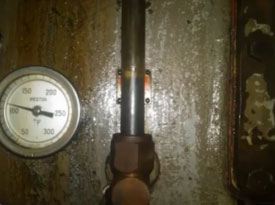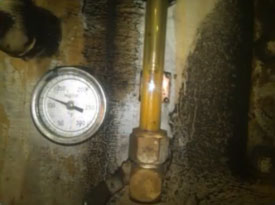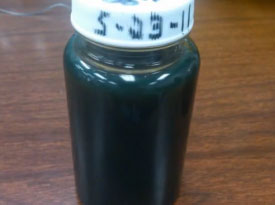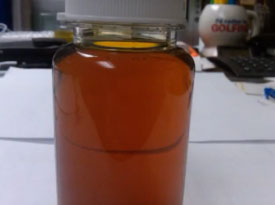How Our Oil Filter Cart Stacks Up
|
We asked an operator to use a Harvard filter cart to clean the oil in their pulverizer gearbox after it had been cleaned by our competitor's filter cart. The results of the test earned us a new customer. This view of the oil after just six weeks on the competitor's cart compared with the same oil after just two weeks on the Harvard system displays Harvard's unmatched filtering performance. |
||||||||||
Comparing oil samples taken from the gearbox while our competitor's cart was in line with a sample taken while Harvard's cart was in operation shows the clear winner in this oil cleaning contest.
|
||||||||||
| Particle Count Lowered by 90% | ||||||||||
| Other filters couldn't bring the particle count below 100,000 particles per milliliter, but adding the Harvard filter cut the particle count by over 90%, reducing the count of particles under four microns to just over 10,000, and particles under 14 microns to less than 100. Harvard systems can actually make used oil cleaner than most new oils -- a point displayed in these measurements of the particles in the gearbox oil. | ||||||||||
.jpg) |
||||||||||
| Fewer particles in the oil meant less wear in the gearbox while the Harvard system was in use. Particles in the oil can turn the metals in the equipment against itself: as particles are crushed against the internal surfaces of the equipment, they break into many pieces, multiplying their destructive effects. As these pieces are pressed into the internal walls of the equipment, they scrape additional metal shards loose, suspending them in the lubricant stream where they too then scrape against the internal walls of the machinery as they circulate through the system. | ||||||||||
.jpg) |
||||||||||
| Metals in the oil, which indicate scoring of the bearings' internal surfaces, nearly vanished while the Harvard system was at work. With a Harvard Corporation filtration system, the data is as clear as the oil itself. Cleaner fluids mean less wear, longer service life, less downtime, and more profit in your bottom line. |
|
We asked an operator to use a Harvard filter cart to clean the oil in their pulverizer gearbox after it had been cleaned by our competitor's filter cart. The results of the test earned us a new customer. This view of the oil after just six weeks on the competitor's cart compared with the same oil after just two weeks on the Harvard system displays Harvard's unmatched filtering performance. |
||||||||||
Comparing oil samples taken from the gearbox while our competitor's cart was in line with a sample taken while Harvard's cart was in operation shows the clear winner in this oil cleaning contest.
|
||||||||||
| Particle Count Lowered by 90% | ||||||||||
| Other filters couldn't bring the particle count below 100,000 particles per milliliter, but adding the Harvard filter cut the particle count by over 90%, reducing the count of particles under four microns to just over 10,000, and particles under 14 microns to less than 100. Harvard systems can actually make used oil cleaner than most new oils -- a point displayed in these measurements of the particles in the gearbox oil. | ||||||||||
.jpg) |
||||||||||
| Fewer particles in the oil meant less wear in the gearbox while the Harvard system was in use. Particles in the oil can turn the metals in the equipment against itself: as particles are crushed against the internal surfaces of the equipment, they break into many pieces, multiplying their destructive effects. As these pieces are pressed into the internal walls of the equipment, they scrape additional metal shards loose, suspending them in the lubricant stream where they too then scrape against the internal walls of the machinery as they circulate through the system. | ||||||||||
.jpg) |
||||||||||
| Metals in the oil, which indicate scoring of the bearings' internal surfaces, nearly vanished while the Harvard system was at work. With a Harvard Corporation filtration system, the data is as clear as the oil itself. Cleaner fluids mean less wear, longer service life, less downtime, and more profit in your bottom line. |











